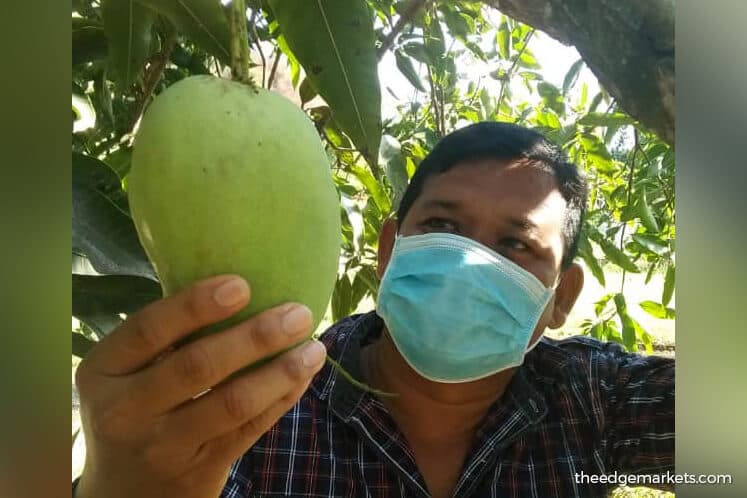
Small farmers in the northern states have been hugely affected by the implementation of the Movement Control Order (MCO) to contain the outbreak of Covid-19. They are unable to deploy workers to harvest their produce and their sales have fallen tremendously. The silver lining is that the pandemic has forced them to adopt technology to stave off further losses.
Mohd Hafiz Indra, also known as Cik Mat, is a Harumanis (a popular green mango planted commercially in Perlis) farmer with a day job in the manufacturing industry. Between March and June each year, which is the Harumanis harvest season, he plucks the mangoes, packs and sells them to middlemen, who will then sell these to the end-consumers.
“Things get much busier during these four months and we focus our time and energy on the farm,” says Cik Mat.
However, the virus outbreak and MCO have greatly affected his farm business and as factories have been shut down, he cannot make up the shortfall with income from his day job either.
“The MCO coincides with the Harumanis harvest season this year. This poses a huge problem for us as harvesting and post-harvesting require a lot of manpower and things need to be done in a timely manner,” says Cik Mat.
“For now, we have to limit our manpower on the ground. Everything is going slow. As a result, a huge pile of mangoes is stuck at our warehouse and these can get overripe if the situation continues.”
He is not worried about consumer demand but the distribution of the harvested fruit. “What worries me most is not the lack of demand. Harumanis is known as the best mango in town and people flock to Perlis from all over the country for this fruit. The trouble is, how to reach the customers,” he says.
The good news in such trying times is that Cik Mat, who has the blood of entrepreneurs running in his veins, is turning on a dime and adapting to the environment using technology to extend the shelf life of his products and sell them online.
While sales at his mango farm dropped tremendously this year, the drop was mitigated by Cik Mat moving a portion of the sales online. In any given year, the farm produces 500kg of Harumanis mangoes per season and sells them all. This year, it has managed to sell 300kg (as at April 8), the bulk of which through online sales.
“Sadly, due to the MCO, we are unable to cater much to our offline customers. But we make up for it by focusing more on online buyers,” he says.
One of the challenges of selling online is that it takes longer for the Harumanis mangoes to reach the customers, who are based far away from Perlis. “Courier services are slower now, so our fruits are subjected to a longer delivery period. Thus, a lot of the fruit becomes overripe, which means the customers receive them almost damaged,” says Cik Mat.
Normally, it takes three days for his mangoes to reach the Klang Valley. Now, with all the delays related to the MCO, it takes five. Nevertheless, he counts his blessings and is grateful that logistics companies are still operating.
Part of the reason Cik Mat has been able to survive these times is that he started collaborating with StixFresh, a company that produces special stickers for fruits to prolong their shelf life through natural means.
When the MCO commenced and fruit farmers were caught off guard, StixFresh CEO Zhafri Zainudin immediately reached out to them to offer help in coming up with a solution to all the unsold fruit slowly turning rotten at the farms. It was Zhafri who connected Cik Mat to Enterprise because of his conviction that the plight of fruit farmers during these times needed to be heard and addressed.
“Fortunately, our company decided to start selling our fruit online this year. It helped us tremendously in fulfilling demand, not only in Perlis but also nationwide. It looks promising. We are even thinking of venturing outside the country,” says Cik Mat.
Before this, he had simply toyed with the idea of selling mangoes online. The pandemic and subsequent almost lockdown was all the impetus he needed to actually do it. “We had been thinking of going online for a while now as we wanted everyone to get a taste of our Harumanis. This year, we actually did it and the satisfaction we got from sharing these mangoes with people outside Perlis is beyond any monetary reward,” he says.
Not that there are no monetary rewards. Cutting out the middlemen has been good for the bottom line. “The margins we enjoy are higher when we sell our mangoes directly to end customers,” says Cik Mat.
As it has started, it will continue, even after the MCO ends. He hopes more private companies will come out with online systems to help farmers get their products to the world. He also wants the government to come up with a clear strategy to market fresh Malaysian produce to the world.